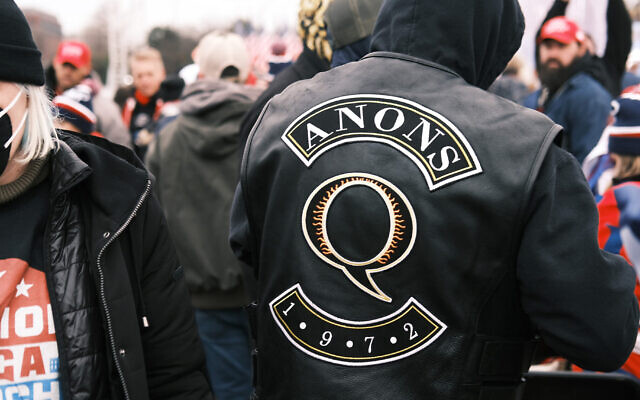The rise of conspiracy mentality in the US
'We live in dangerous times. Judeophobia (or antisemitism) is rising. The rise of the conspiracy mentality is something that Jews need to watch with special care'.
JEWS around the world know how much Donald Trump has meant to Israel. He moved the American embassy to Jerusalem, promoted a new peace plan, and supported the efforts by Israel to establish diplomatic relations with new Arab nations. This is all very important and should not be minimised.
But there is a disturbing side to Trump that also needs to be acknowledged by Jews, an aspect of his presidency that continues to be important even though he failed to win reelection: his aggressive and persistent promotion of a new conspiracy mentality. In spite of his support of Israel, this other side of Trump was, in the end, a significant threat to Jews everywhere.
I use the term “conspiracy mentality” rather than “conspiracy theory”, because the word “theory” is not appropriate when talking about those who believe in conspiracies. Theories are constructs grounded in research, facts and logic. For example, evolution is a theory, but it is not just something that some people “believe”.
Trump’s encouragement of the conspiracy mentality hardly needs to be documented here. Everyone can think of examples without trouble, because they are woven into the fabric of his presidency and to the legacy he leaves behind him. But the scope and depth of the conspiracies he has either initiated or encouraged include QAnon, the belief that a secret group of Democrats are attempting to take over the US, that they are Satan-worshippers that run a worldwide child sex-trafficking operation, and that only Donald Trump could save us from them. And they include the notion that the COVID-19 pandemic was either completely fake (a “plandemic”) or that it was at least exaggerated systematically by evil forces who had as their goal removing Trump from office. And they include – most dramatically – the unfounded accusation that the 2020 election was stolen by a cabal of Democrats and that votes for Joe Biden were manufactured illegally to achieve this goal. And this has been coupled by his assault on the very idea of facts and all mainstream sources of information.
We have to ask two questions: 1) who believes things like this?; and 2) what does this mean for Jews? First of all, these conspiracy notions are not “theories” that have any legitimacy. It makes no sense to argue with someone who believes these things; fact-checking does not convince them, logic makes no difference. Those to whom these notions appeal have a psychological need for them. They cling to them with a ferocity that is unsettling.
An article by Karen Douglas, Robbie Sutton, and Aleksandra Cichocka in Current Directions in Psychological Science pulls together recent research in the field and suggests three main sources of this need for conspiracies: epistemic, existential and social.
Epistemic needs are needs for finding satisfactory causal explanations for events and protecting cherished beliefs. It is helpful for some to believe that those who challenge their beliefs are involved in a conspiracy against them. This allows them to ignore challenges to cherished feelings and beliefs.
Existential needs are for safety and the illusion of being in control when so much seems overwhelming in life. This is why more people turn to conspiracies when they are feeling uncertain or threatened.
And finally, the article by Douglas, Sutton and Cichocka points out that people who have a deep need to maintain a positive image of themselves turn to conspiracies. They can attribute negative outcomes in their own lives and in the lives of their chosen groups to others; they are not to blame.
So the conspiracy mentality is, more than anything else, an expression of psychological needs by those who embrace them. But what does this mean for Jews? The danger I see is that what is usually called “antisemitism” (I prefer Pinsker’s term “Judeophobia”) is the deepest and most destructive conspiracy mentality in history. Judeophobia is more than a belief that Jews are bad; it is the belief that Jews secretly control society and are at the root of all the bad things that happen in society. Both Bari Weiss in How to Fight Anti-Semitism and Deborah Lipstadt in Antisemitism Here and Now explain that this animus toward Jews is fundamentally about seeing them as conspirators.
And herein lies the danger for Jews today. When the conspiracy mentality flourishes, Jews suffer, because sooner or later, Jews are identified as the source of the conspiracy. This has been true since Jews were accused of conspiring to kill Jesus, continued into the Middle Ages when the blood libel spread through the world, and has been sustained through the rise of Nazism, when Jews were accused of conspiring to keep Germany from becoming great again. And while conspiracies have been around in the US for a long time, belief in them was until recently relegated to fringe groups. Donald Trump has made them mainstream. His encouragement of the conspiracy mentality will end up hurting Jews, regardless of his support for Israel, because – in the end – Jews are always blamed.
We live in dangerous times. Judeophobia (or antisemitism) is rising. The rise of the conspiracy mentality is something that Jews need to watch with special care.
Solomon Dennis Stevens has a PhD in political science and has published two books and a number of scholarly articles.


comments